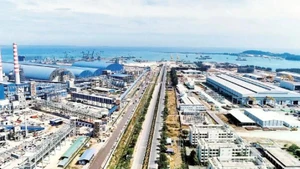Finding ways to overcome difficulties
The private economy includes three sectors: private enterprises, individual economic sector, and collective economic sector. Vietnam currently has about 940,000 private enterprises, accounting for 98% of the total number of enterprises in the country. Additionally, there are more than 5 million individual business households and 32,000 cooperatives. Many large private enterprises such as Vingroup, Masan, Sun Group, Vietjet, Thaco, TH have reached regional and global levels, significantly contributing to raising Vietnam's reputation in the market. However, according to Can Van Luc, member of the National Financial and Monetary Policy Advisory Council, the fact that the private economic sector's contribution to GDP over the past 20 years has increased by less than 3% reflects many shortcomings. In addition, the contribution of private enterprises and business households to the state budget is also limited compared to existing resources. The private economy contributes 50% of GDP but only 30% of the state budget. Specifically, more than 5.2 million individual business households contribute only 1.64% of the state budget.
The private economic sector in Vietnam has more than 6.1 million business establishments but still mainly maintains small to micro-sized models, many business households do not want to convert into enterprises. Ly Kim Chi, Vice President of the Ho Chi Minh City Business Association, said that cumbersome administrative procedures, the request-grant mechanism and the mindset of "if you can't manage, then ban" are creating many barriers that make business households reluctant to convert their models. Businesses face various difficulties from tax refunds, applying for investment licenses to building factories, and expanding production scale. Despite paying 20% of income tax to the state budget, private enterprises are always "inferior" in accessing public services, capital, land and business opportunities.
Why has the private economic sector in Vietnam not yet developed strongly? According to Thai Thanh Quy, Standing Deputy Head of the Central Committee for Policies and Strategies, the reasons come from two sides. The corruption situation causing difficulties in the administrative apparatus is still discouraging businesses. Many obstacles from regulations and procedures of state management agencies cause businesses to lose opportunities, time, operating costs, reduce competitiveness, even cause frustration, hesitation to start a business or upgrade, expand, develop production and business. On the other hand, it comes from domestic businesses and entrepreneurs. The business thinking of many private enterprises still has many limitations, even some businesses don’t want to grow or not willing to grow.
Quy proposed five solutions to overcome current difficulties for the private economic sector, prioritising reform and innovation to help businesses and business households have a more optimal operating environment.
According to this expert, in the coming time, it needs a clear strategy, mechanism, and policy for private economic development, in which, the quality of development for the subjects is clearly defined. Large private enterprises play a leading role in key areas, participating in solving major national problems. Small and medium-sized private enterprises develop closely with the formation of production funds, gradually becoming large enterprises. Individual business households strongly transform to operate according to the enterprise model.
Changing mindset
La Thi Lan, General Director of Tien Loc Investment Group, said that a flexible and open mechanism will help private enterprises uphold their potential and increase their contribution to the economy. Private enterprises expect the state to continue removing legal barriers, creating more favourable conditions for accessing capital and land, as well as ensure a transparent and fair business environment.
“To improve productivity and competitiveness, we hope that the government will create stronger incentive mechanisms for research and development activities. These include preferential tax and credit policies and support for businesses to invest in science and technology and innovation. In particular, it is necessary to boldly place orders with private businesses in infrastructure projects, industrial production and green energy. Furthermore, it is necessary to strengthen cooperation between the state, enterprises, institutes, and schools with more specific mechanisms,” Lan analysed.
To create momentum for the private economy to develop rapidly in the new period, according to Dr Can Van Luc, first of all, we must have a more correct view of the role and position of this sector in the economy. It is necessary to ensure three important rights for the private economy, so that private enterprises can confidently develop: the right to own property, the right to freely do business in things not prohibited by law, and the right to compete equally.
Additionally, it is necessary to increase access to three important resources for enterprises, including: land, finance, and technological innovation. Attention is also needed towards improving the investment and business environment, reducing corruption in administrative management, and soon issuing a legal framework for new business models such as green economy, circular economy, and digital economy.
According to Luc, Vietnam needs to soon establish a fund to support digital transformation and green transformation for enterprises. Currently, countries in Asia such as China, Republic of Korea (RoK) and Japan all have funds to support green transformation for enterprises, especially small and medium-sized enterprises. The establishment of a venture capital fund is also necessary to create leverage for the private economic sector to develop in scale, focusing on start-ups and innovation.
“Businesses must be classified for management and support: small, large and medium-sized businesses, not cover three pots with the same lids, which is impossible to match. Supporting private enterprises to develop to integrate and reach international standards should be based on the level of enterprises’ contribution back to the economy such as contribution to the budget, employment fund or social security, not support based on scale,” he added.
Mai Huu Tin, Chairman of the Binh Duong Provincial Business Federation, said that there are three core solutions in the coming period to create more effective development momentum for the private economic sector in our country. First, it is necessary to increase the investment rate for infrastructure development in the coming years. Vietnam is currently investing only more than 5% of GDP annually in infrastructure. In addition, it needs to improve the business environment, administrative procedures, actively eliminating the request-grant mechanism, increasing the accuracy of data and reports through e-government applications. Finally, it should focus on investing in human resources with many policies to support education and training.
Reforming institutions and mechanisms continuously and strongly, with a roadmap and with transparent division of tasks is the proposal of Nguyen Quoc Ky, Chairman of the Board of Directors of Vietravel. According to him, competent authorities need to study carefully before issuing new mechanisms and policies related to the private economy to gradually remove barriers and add more opportunities. The government should build a detailed, clear roadmap, with specific KPIs and strengthen monitoring through KPIs in this activity. Support for businesses in the coming period also needs to be timely, ensuring fairness in policies. The government also considers the establishment of central specialised teams for effective and consistent implementation, avoiding unnecessary multi-level and multi-sector implementation.
Ky proposed the need to change perceptions and assign roles to design policies in the direction of a "three-legged stool". In which, the state economy plays a key role instead of the current three-level thinking.
















